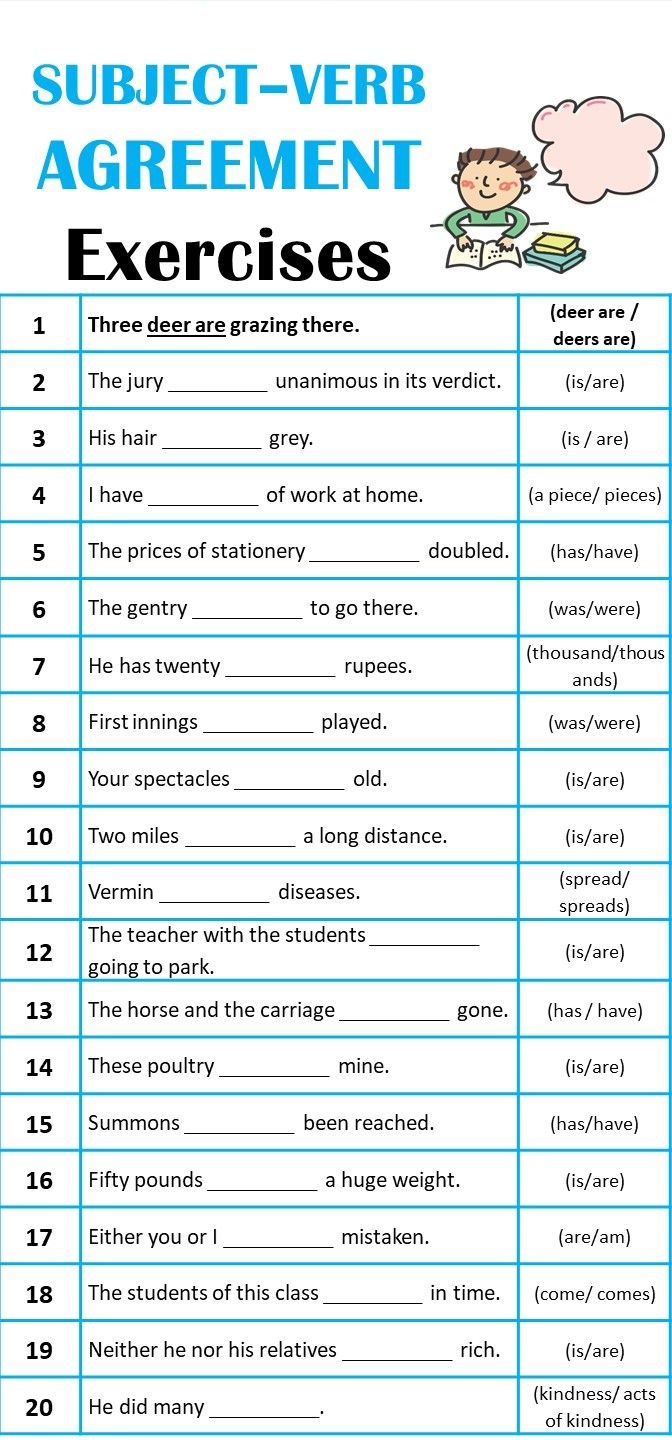Rules of English grammar are confusing most of the time, and the rules may not be followed one after the other for every sentence you form. The rules can be twisted according to needs, and hence there are deviations of each rule. However, below listed are some basic rules that one must understand to understand the subject-verb agreement’s whole ordeal. Keep these basic rules in mind, and then you will know what to do, when to do it, and how to do it.
Gather Information Regarding Basic English Skills and become proficient in the language and speak fluently with confidence. Try the Tips over here and Improve your English Writing and Speaking Skills.
Rule 1
A verb agrees with its subject in number and person.
Due to the ‘rule of proximity,’ we tend to make the verb agree in number with a noun nearby instead of the subject. Therefore words coming between the subject and the verb do not affect whether the verb is singular or plural.
Examples:
- Incorrect: The quality of the mangoes were not good.
- Correct: The quality of the mangoes was not good.
- Incorrect: The price of potatoes have gone up in the past few weeks.
- Correct: The price of potatoes has gone up in the past few weeks.
Rule 2
A singular subject goes with a singular verb, and a plural subject goes with a plural verb.
This rule is the most basic and commonly used rule that will get you through most subject-verb agreement.
Examples:
- Sita walks to school every day.
- Sita and Rita walk to school every day.
- Shreya loves to swim.
- Shreya and Somya love to swim.
- My dog eats very fast.
- All dogs eat very fast.
- Rita loves to go to school.
- Gita and Ram love to go to school.
Deviation 1
Rule 2 does not apply to simple past tense that has no helping noun.
Examples:
- The crowd rattled in the absence of the police.
- The crowd rattles in the absence of the police.
Deviation 2
The singular subject ‘You’ and ‘I’ take plural verbs.
Examples:
Using ‘I.’
- I eat a biscuit every few hours. She eats a biscuit every few hours.
(Note that the second sentence shows when a singular subject takes a singular verb. The same pattern is followed below)
- I type very fast. He types very fast.
- I love to go to school. She loves to go to school.
Using ‘You’
- You are extremely inconsiderate. Riya is extremely inconsiderate.
(Note that the second sentence shows when a singular subject takes a singular verb. The same pattern is followed below)
- You live in constant fear. Ram lives in constant fear.
- You are scared of everything. She is scared of everything.
Deviation 3
Rule 2 does not apply to the following helping verbs when in use with the main verb:
- Must
- Might/may
- Should/shall
- Could/can
- Would/will
Examples:
(Note that below, in each example, the first sentence is plural, whereas the second sentence is singular, but both take the same verb.)
- Rita and Sita must go to school. Rita must go to school.
- They might join the football team. He might join the football team.
- Ram and Sneha would win. Sneha would win.
- They should go to watch the movie. She should go to watch the movie.
- Sreya, Sneha, and Shyam can win the game. Sreya can win the game.

Rule 3
Noncount nouns take up a singular verb.
Examples:
- Knowledge is free.
- Education is drowning in capitalism.
- Too much sugar is harmful.
- The government is doing a good job.
- Her hair is pink.
- The tea tastes sour.
- Dancing is an art.
Some Non-counts nouns are:
work, homework, money, cash, luggage, jewelry, luggage, rice, water, fire, air, soil, hair, health, happiness, medicine, grief, mathematics, physics, chemistry, history, biology, Chinese, Latin, English, Spanish, Japanese, tea, chess, soccer, football, cricket, swimming, dancing, riding, wine, ice, music, furniture, bravery, honesty, patience, etc.
Rule 4
A singular verb is used when two or more nouns are connected by ‘nor’ or ‘or.’
Examples:
- The manager or Miss. Sharma leaves the country tomorrow.
- Neither food nor water was found on the table.
- The CEO or Mr. Malhotra hates people who are late.
- Neither she, not her, was at the party.
Deviation
Rule 4 does not apply when the subjects joined by ‘or’ or ‘nor’ are of different persons. In this case, the verb agrees with the nearer subject (by the rule of proximity).
Examples:
- Neither Reema nor I have anything to say to her mother.
- Either the pitbull or golden retriever has stolen my slippers.
- Neither Shreya nor them were playing golf.
Rule 5
A singular verb must always follow after using:
Either, neither, everyone, each, many a, someone, nobody, everybody.
Examples:
- She asked me whether either of the students was capable of clearing.
- Each of these plants is found in Africa.
- Neither of the classmates was capable of competing with him.
- Many a man has failed to prove their love.
- Everyone in the house does their laundry.
Rule 6
Two nouns qualified by ‘each’ and ‘every,’ even though connected by ‘and,’ require a singular verb.
Examples:
- Each and every student was given a piece of cake.
- Every dog and every cat deserves to be loved.
Rule 7
Some countable nouns only have a plural form but are singular in meaning. These nouns take a singular verb.
Examples:
- The news is not trustworthy.
- Politics is a dirty game.
Examples of some nouns that are plural (in form) but with a singular meaning are:
mathematics, billiards, news, crisis, etc.
Deviation
Rule 7 does not apply when these countable nouns only have a plural form with a plural meaning. In this case, the noun takes a plural verb.
Examples:
- The scissors are very sharp.
- Jitters give rise to anxiety.
- His earnings exceed his expectations.
Some countable nouns that only have a plural form are:
annals, suds, shenanigans, riches, clothes, mathematics, jitters, earnings, goggles, pants, panties, shorts, trousers, jeans, binoculars, pliers, headphones, tongs, etc.
These plural-only nouns are usually used with ‘…pair of’.
Rule 8
Some nouns are singular in form but plural in meaning. In such a case, the nouns take a plural verb. (It is the meaning that is taken into account.)
Examples:
- Her target audience is teenagers.
- None are left to pay his debts.
Rule 9
A collective noun takes a singular verb when thought of as a whole but takes a plural verb when the individuals forming the collective noun is thought of. (As mentioned earlier, as it is the meaning that is taken into consideration.)
Examples:
(Note that the collective noun is thought of as a whole in the first sentence, and in the second sentence, the individuals are taken into consideration).
- The Committee is making good decisions.
- The Committee are divided into certain points.
- The community is judgmental.
- The community is being forced to remove her family.
(However, whatever you perceive, the nouns should be consistent throughout the sentence with the singular or plural form they are using.)
- The managing committee has sent the reports to all its followers.
- Society is ready to accept the flaws of its members.
Some collective nouns are:
government, class, society, herd, crowd, etc.
At times, these collective nouns are used with terms like ‘herd of,’ ‘flock of,’ ‘swarm of,’ etc.
Rule 10
Like Rule 9, when the plural noun is denoting a specific quantity, considered as a whole, a singular verb is used.
Examples:
- Two minutes is the time limit for your video.
- Three parts of the pizza are left for them.
- Four kilometers is easy to cover by road.
Rule 11
At times, a plural noun is a proper noun for a singular object. Thus a singular verb is used.
Examples:
- The Arabian Nights is her favorite.
- The United States has expensive healthcare.
- Midnight Memories is a studio album by One Direction.
Rule 12
A plural verb is used in a relative clause when followed by ‘one of…’ or something along those lines.
Examples:
- He is one of those batsmen that still have their charm alive.
- They are one of those people who are always late.
- She is one of those dogs who always demand attention.
- Rita is one of those girls who own their girly side instead of hiding it away.
Conclusion
Subject-verb agreement is the crux of most English grammar, and it is polished only with practice. The above mentioned are some extremely basic yet, crucial rules of subject-verb agreement. Most of the rules can be twisted according to needs. You already know (since it is mentioned in the rules above) that it is the thought that forms your grammar rule and thus differs from person to person.
However, keep in mind that you might have all the grammar rules available memorized (I am not just talking about the subject-verb agreement but anything), yet if you do not know how to apply those rules, your effort is going to waste. Most people do not even need to learn the rules to know correct grammar; they just know so because of practice. If you listen, read and watch English speaking shows and music, your grammar will be polished automatically. You will not need hundreds of rules to go by. Thus, practice does make a man perfect.
